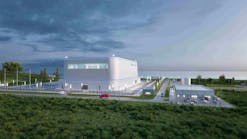Citroniq Chemicals Selects Nebraska Rail Campus for Bio-Polypropylene Conversion Plant
Biochemical producer Citroniq Chemicals has selected Falls City's Mid-America Rail Campus as one of its bio-based production mega-sites.
The project is part of the Nebraska BioEconomy Initiative. Citroniq will convert ethanol produced from Nebraska corn into bio-based polypropylene.
"Citroniq is building the world's largest decarbonization platform, capturing over 7 million tons of CO2 per year, while producing byproduct bio-polypropylene pellets (OrganicPP) that are a critical component in the decarbonization efforts of the automotive industry and other U.S. manufactured goods,” Kelly Knopp, CEO of Citroniq Chemicals, said in a statement. “By building multiple plants at full commercial scale, Citroniq can quickly transform the plastics industry in a material way, reducing the carbon footprint of the entire US polypropylene production base by 20%.”
This process will not only reduce the dependence on petroleum-based production but also enable additional revenue to Nebraska's farms and rural communities. The plant is expected to be operational in 2029.
"Our vision is to create bio-plastics manufacturing hubs in the U.S. Midwest that upgrade Nebraska corn into a wide range of durable plastics goods, while creating high paying manufacturing careers in rural communities,” stated Mel Badheka, President of Citroniq Chemicals. “Nebraska is an ideal location for these hubs due to the availability of local ethanol feedstock, advantaged logistics to industrial plastics consumers and high-quality rail infrastructure to support the entire value chain."
Polypropylene is a polymer used for ropes, fabrics and molded products. It is used extensively in the automotive manufacturing industry.
Bio-polypropylene is considered carbon reductive as CO2 is embedded within the product.





